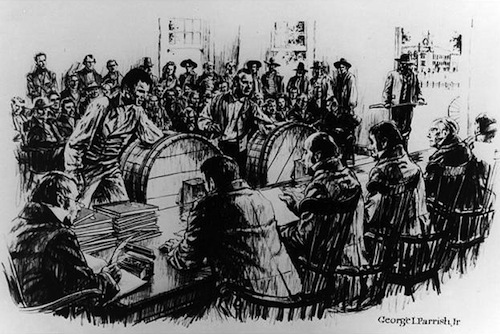Georgia Encyclopedia -- "Land Lottery System"
Lady Jane, July 9 2014
The removal and pacification of the American Indian tribes is a story in its own right, infamously so in Georgia where the Trail of Tears was the ultimate fruit. However, there was also the issue of how the land was distributed to those settlers who followed in the wake. Many different methods were used in different parts of the country, but a unique solution was devised by the state of Georgia -- the Land Lottery.
Between 1805 and 1833, about three-quarters of Georgia's land was distributed to 100,000 families in a series of lotteries, in which the winners could purchase lots for minuscule prices. Typically lots of paper were strewn in a barrel, and each entrant could select one through a blind drawing. Some of the papers were blank, in which case the unfortunate person received nothing. Others corresponded to lots of land. All of this land was appropriated in chunks from the Cherokee and Creek Indians.
Before this system came into place, there was an enormous uproar in the state involving the sale of lands to the west, codified in the Yazoo Act. Leveraging their political connections, a small group of investors purchased 60% of modern-day Alabama and Mississippi for bargain prices. The resulting outrage from the common people of Georgia led to a new system of land distribution.
The Georgia Encyclopedia covers this episode1, as well as many others, from the history of Georgia since that state's inception.
Speculation and corruption were rife in the realm of frontier lands, and the lottery was seen as a transparent, non-manipulable way to distribute these lands in a truly random fashion. As such the land lottery was a tool of the white lower-classes to combat the power of the aristocracy, who would have benefitted more from cronyism and bribery. The end result in Georgia was a more even distribution of land compared to other southern states.
In modern times, some academics have studied the long-term effects of the land lotteries on the families and offspring of their winners. In the typical case, the windfall prosperity of free land failed to transfer to subsequent generations, highlighting the challenges of an uneducated, lower-class background when it relates to financial management and quality of life.
1Gigantino, Jim. "Land Lottery System." New Georgia Encyclopedia. 05 June 2014. Web. 09 July 2014.
